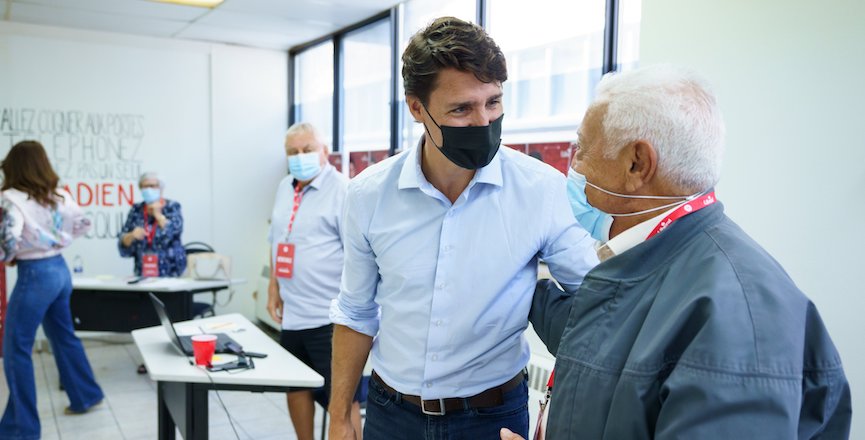The story most are telling about Canada’s 44th federal election on September 20, 2021 is that it produced almost exactly the same result as the last one. We as a country spent more than $600 million to achieve exactly nothing.
It was a disappointing exercise in futility for all parties — except, perhaps, the Bloc Québécois, which looked like it might lose a handful of seats at the beginning of the campaign and ended up increasing its popular vote and electing a couple of additional MPs.
It was a particularly bitter election for New Democrats, who came painfully close in a number of key ridings such as Berthier — Maskinongé in Quebec, where Ruth-Ellen Brosseau was trying to regain the seat she held for two terms; Jody Wilson-Raybould’s former seat of Vancouver — Granville; and Kenora and Toronto — Davenport in Ontario. (As of writing, votes are still being counted, so there is a very slim chance some of these ridings might flip).
Late in the campaign, the Liberal party broke ties with its candidate Kevin Vuong in Spadina — Fort York, in downtown Toronto, because of allegations of sexual misconduct. Vuong defeated the NDP candidate nonetheless.
But the real story of the election was the emergence in this country of what we would have to call a form of voter suppression.
Thousands of Canadians had a harder time casting their vote in the 44th election — the only one held in the midst of a pandemic — than in any other election in more than 75 years.
In the U.S., local partisan officials actively practice voter suppression. They do everything in their power to discourage Black, Brown, poor and young people from voting by forcing them to wait hours in line, reducing advanced polling places, questioning their identity and of course — gerrymandering.
Here in Canada, we don’t allow the foxes — partisan officials — to guard the electoral henhouse. We entrust that task to a neutral agency, Elections Canada.
Nonetheless, because of the peculiar circumstances engendered by COVID-19’s fourth wave, we had de facto voter suppression in our 44th federal election. It might not have been intentional and malicious as in the U.S. But it was real.
The truth is that the Trudeau government decided to call an election in the midst of a pandemic knowing full well that campaigning and voting would be more difficult than in normal times.
Elections Canada’s leaders stoically said they would manage, somehow. Earlier, they had signalled to the government that if an early vote were to happen, they would prefer a somewhat longer campaign. Justin Trudeau ignored that request and chose the shortest campaign possible under the law: 36 days.
The result was that in many ridings there were far fewer polling places than in 2019. As well, Elections Canada officials decided not to make it possible for post-secondary students to vote on campus, as they had done in the past. And voting by mail, which many more Canadians wanted to do this time, was complicated, confusing, and, perhaps (we don’t know yet) unreliable.
On election night, we had the spectacle of potential voters waiting hours in long lines, in densely populated places such as Toronto and Vancouver, hours after the TV networks had projected a Liberal victory.
In Toronto, some would-be voters had to wait for what seemed like an eternity under a major urban highway, the grimy and grey Gardiner Expressway.
We are accustomed to unseemly spectacles of that sort in the U.S.
In Canada, we used to be able to take pride in our non-partisan, professionally-managed elections. This election put a big dent in that pride.
Genuine cooperation with other parties now?
Prime Minister Justin Trudeau did not seem chagrined or apologetic about calling an unnecessary election when he claimed victory on Monday night, although he solemnly promised to heed the voters verdict and work with other parties in the House of Commons.
Trudeau has the distinction of being the only prime minister to win back-to-back victories, while losing the popular vote both times. His party did not even garner a third of the popular vote this time, in 2021, or in 2019.
Liberals will tell you there is an effective progressive majority in Canada, when you add together their votes with those for the New Democratic and Green parties, and maybe even some of the Bloc votes.
Trudeau said the same thing in 2019. Those words did not mean much when it the time came to act. This time, will the Prime Minister take the logical next step and actually share power with other parties?
During the election campaign the Liberal leader said we have no tradition of coalition governments in this country. Well, maybe it is time to establish some new traditions here.
If the Liberals are going to partially claim votes for other parties, especially the NDP, are in some sense votes for their notionally progressive agenda, perhaps it is time they learned how to work in a systematic and consistent way with those other parties.
In a petulant moment during the campaign, the Liberal leader said an election outcome that did not give his party a majority would result in another election in 18 months.
There was none of that kind of talk on Monday night, September 20, or rather in the early morning of September 21. The re-elected prime minister was waving olive branches and talking about co-operation; not threatening endless elections.
Now, the question is, how will he act on that high-sounding rhetoric?
Karl Nerenberg has been a journalist and filmmaker for more than 25 years. He is rabble’s politics reporter



